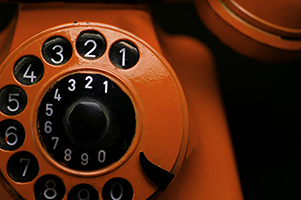

Dialing for Dollars
The telephone rings four times and a voice says "Gem Lab." "I'm sorry, I didn't catch that. Who is this?" you ask in desperation. You get an all too brief and shallow answer "I'm Ricardo." Realizing that you still do not know if this is who you wanted to call, once more you ask "I need an insurance appraisal - do you appraise?"
 Selling Yourself
Selling Yourself
If the above scenario is how your telephone conversations are, then you need to make a few changes. First of all, you are not offering a service but selling a service. That's right, selling a service.
Tell your potential customer exactly who you are and what you do. You are Ricardo Marti. Your business is called Cuban Gemological Laboratory. Answer by stating "Hello, I am Ricardo Marti of Cuban Gemological Services, how may I help you?"
What the Customer-to-be Thinks
Whenever I call a business and am placed in a position of trying to sort out who it is that answered or even if I have the right telephone number, I become frustrated. It takes a few moments to calm down. If during that first few moments I become more aggravated, then I will select another service.
Your image is central in getting customers. We work hard to render a perfect website. We spend time on the décor. We acquire the latest instruments. We take courses, seminars, read articles, books and other professional skill building opportunities. Proudly we display our certificates and diplomas. However, the first encounter by a customer is usually by telephone. Take the time to polish your telephone demeanor.
Shopping You Out
Most calls will be to ask what you charge for your services. If you have taken the time and effort to become a trained professional, then you will want to charge accordingly. However, your competition may not charge a fee commensurate with the assignments - maybe because they fall short of a professional level of work.
Nevertheless, you cannot compete charging their fees.
If they serve hamburgers and you serve porterhouse steaks - then you must sell your services and not compete on price.
Make a short list of questions you know the telephone shoppers should be asking. Next time a shopper calls and asks how much you charge; instead say "If you are calling appraisers to find someone to fit your needs, let me give you a few questions that you should be asking. Please, get a pencil and paper. Let me know when you are ready."
Then read them two or three questions that are simple to understand and make the point that you are their best bet. My two favorite questions were:
(1) Ask the appraiser to read you the fine print that starts with "We assume no liability ." The customer will usually be flabbergasted and ask, "Do they really do that?" Immediately I would add "Yes, unfortunately it is quite common. They take your money, tell you they are an expert and perform a service - all without wanting to take any liability."
(2) Ask if they have training specifically for personal property training. Not product knowledge training like a gemologist should have, but valuation training. Look at it this way - one can be the world's expert on the identification of wood. He or she can tell you that it is oak, teak, willow, et cetera. But can they tell you what a wood desk is worth? That takes valuation training.
The Proof is in the Numbers
Very seldom would I lose this shopper as a customer. In fact, they would often have an appointment already and call back the appraiser to ask these questions. I would get a call later on saying that they cancelled and want to make an appointment. Once, an angry jeweler called me. He shouted "You are stealing our appraisal customers!" I calmly answered "I charge three times what you charge, therefore do you not see how stupid what you just said sounds?" He hung up on me.
Eventually customers started telling me that my rates were very reasonable. I decided to check out my competition. They had, to my surprise, raised their rates to match mine. No doubt they reasoned that if I could get those fees, they could too. I raised my fees and found my habit of offering a couple of questions still worked.
Conclusion
Do not be afraid to charge a fee that matches the work and risk you are taking. Yes, some shoppers will take price over professionalism but they are not as common as you may think. Most shoppers think that all appraisers are equal. Your task is alert them that it is not true. My approach was to provide questions to ask when shopping by telephone.
Today, you will want to ensure your website has a set of questions for shoppers to use - depending on the assignment. Shoppers armed with such a set of questions do not take long to realize they are calling appraisers who just hung out their shingles and did not avail themselves of a valuation education. Sadly enough, several customers have told me that when they asked the question about liability, the appraiser hung up on them. Great!
Respectfully submitted,
Bill Hoefer